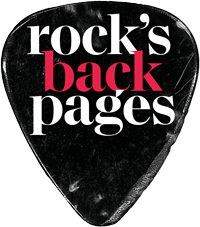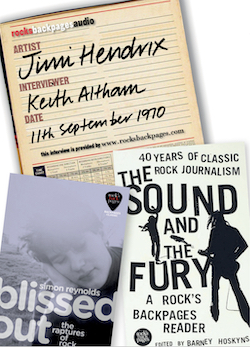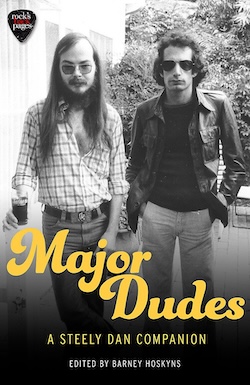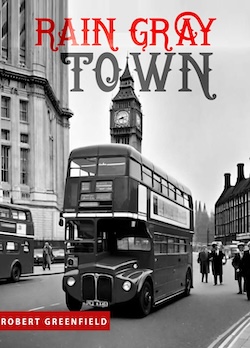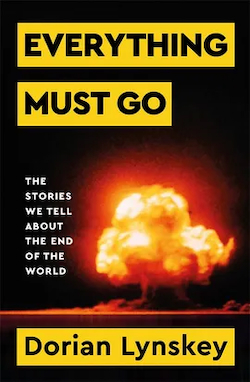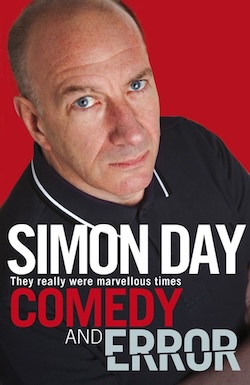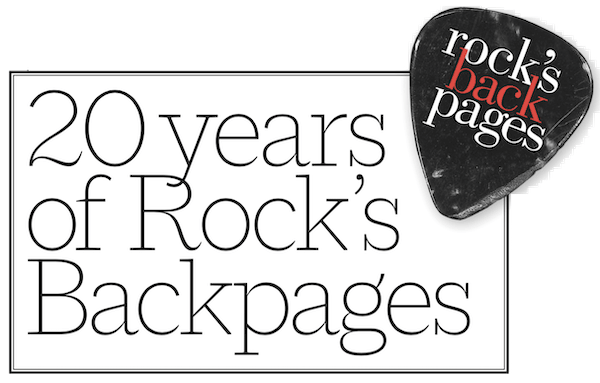Cultural studies and theory
78 articles
The Beatles, Cliff Richard, The Rolling Stones: Pop Music Democratised
Essay by Geoffrey Cannon, New Society, 3 December 1964
Author's note, 2018: Here is my late 1964 insight on the transformation of British pop into rock which can be dated to 21 February 1963 ...
Chuck Berry, Ray Charles, Billie Holiday, The Rolling Stones: From Pop Singers To Rock Bands
Essay by Geoffrey Cannon, unpublished, 1965
Update, March 2019: I KNOW exactly when I wrote the piece below, where I was, and why I withdrew it from publication. It was January ...
Essay by Geoffrey Cannon, The Guardian, 3 December 1968
2019: Thoughts after half a century. The piece below written as rock as a genre and a concept was emerging stands up quite well. As ...
Essay by Richard Cromelin, UCLA Daily Bruin, 29 January 1969
IT'S GETTING toward the end. It's building and building and building. The intensity he is projecting is communicated to the whole crowd. He is not ...
Canned Heat, Muddy Waters, Johnny Winter: The Blues
Essay by Miller Francis Jr., The Great Speckled Bird, 16 June 1969
"All new technologies bring on the cultural blues, just as the old ones evoke phantom pain after they have disappeared." — Marshall McLuhan, War and ...
LeRoi Jones: Black Music (MacGibbon and Kee 36 shillings).
Book Review by Richard Williams, Melody Maker, 8 November 1969
IN HIS writings for Downbeat and Kulchur magazines, LeRoi Jones — poet, playwright, essayist, critic and revolutionary — provided many of the first signposts to ...
Book Review by Greg Shaw, Who Put The Bomp!, October 1970
WITH THIS book, the study of rock & roll reaches a level of sophistication matching that of blues and jazz research. The day is gone ...
Alan Lomax: Making a Science of Man's Music
Profile and Interview by Geoffrey Cannon, Los Angeles Times, 23 January 1972
Alan Lomax, the man who went into the fields of the southern states in the 1930s and brought the glory of the blues to the attention ...
T. Rex: Letter from Britain: Life's a Gas, I Hope It's Gonna Last — Notes On T. Rex
Column by Simon Frith, Creem, July 1972
ZONK. THIS column is going to be about how things look in and from England. More to the point it's going to be about how ...
The Beatles, Bob Marley & the Wailers: Is Natty Dread better than Sgt. Pepper?
Essay by Idris Walters, Sounds, 24 May 1975
It doesn't matter, says IDRIS WALTERS. Rock's big enough, and the WAILERS are making waves... ...
Interview by Richard Harrington, Unicorn Times, June 1975
"I'VE BEEN doing what I'm doing for five years on records and for longer in my life," says Gil Scott-Heron, who seems to be approaching ...
The Clash, Sex Pistols, Throbbing Gristle, The Vibrators: Punk and the Sex Pistols
Essay by Ed Jones, The Spectator, 27 November 1976
BEWARE! WHEN Britain's biggest record company, EMI, and the Institute of Contemporary Arts, the citadel of the self-regarding avant-garde, unite behind a single idea within ...
The Clash, Sex Pistols: Beyond the Dole Queue: The Politics of Punk
Essay by Simon Frith, The Village Voice, 24 October 1977
The Clash and the Pistols have established social realism as an essential part of punk ideology, but this does not make their music the "direct ...
Patti Smith: A Portrait of the Young Woman as an Artist
Interview by Stephen Demorest, Sounds, 21 January 1978
BACK IN THE '60s, when much of America was getting high on mind-altering drugs, Patti Smith never touched a pill, and never puffed a joint ...
Simon Frith: The Sociology Of Rock (Constable. £7.50; paperback, £3.50)
Book Review by Michael Watts, Melody Maker, 28 October 1978
FUN OR PROFIT? ...
Red Crayola: "...THE IDEOLOGICAL FEATURES OF ANY WORK AS A FUNCTION OF CONSUMER RELATIONS...
Interview by Andy Gill, New Musical Express, 21 July 1979
...AS OPPOSED TO DEMOCRATIC ORGANISATIONAL IMPERATIVES; SECTIONAL MILITANCY AS OPPOSED TO PRIVATISED MILITANCY, OF WHICH YOU FIND A GREAT DEAL IN POP MUSIC — THE CRITICAL ...
Brian Eno, Talking Heads: Brian Eno: Energy Fails The Magician
Interview by Richard Williams, Melody Maker, 12 January 1980
After spending the last decade redefining rock music, all Brian Eno wants now is an honest job of work and a place to lay his ...
Book Review by Robot A. Hull, Creem, May 1981
Less Is More? ...
Essay by Ian Penman, New Musical Express, 19 December 1981
Overdressed twits taking Polaroids of one another in posey little clubs? Or the stern soapbox caterwauling of commentators who got themselves into a blue funk about everyone else's ...
Sound Effects: Youth, Leisure, And The Politics Of Rock'n'roll by Simon Frith (Pantheon)
Book Review by Toby Goldstein, Creem, June 1982
Pithy Frith Froth Follows Forth ...
Wanted: a Rock Valhalla for the Golden Oldies
Comment by Mick Brown, The Guardian, 4 August 1983
Up and down the country sweet little sixteens have just about half a million signed autographs. In fact, all the best rock 'n' roll memorabilia ...
Subbed Culture: The Meaning of Bile
Essay by Barney Hoskyns, New Musical Express, 18 February 1984
Should the rock press only reflect what's happening, or has it the power to make things happen? With the proliferation of teen pop glossies, which ...
Essay by Ian Penman, New Musical Express, 8 September 1984
IAN PENMAN goes over the top, typewriter at the ready, and asks, Can one speak of the state of pop without protecting the interests of ...
Overview by Jon Savage, i-D, February 1986
Jon Savage is one of the arch voices of our time, a blithe spirit with a vicious tongue and a wicked pen: dedicated, deadly and ...
Pop Journalism: Write or Wrong?
Overview by Frank Owen, Melody Maker, 24 May 1986
Is it pop we're disillusioned with, or pop journalism? Is Paul Morley the curse or the saviour of the scribbling classes? Frank Owen takes a ...
Essay by Simon Reynolds, Melody Maker, 19 July 1986
Simon Reynolds ventures down hip hop's mean streets and finds something nasty lurking in the shadows — something that guilt-ridden white liberals might prefer to ...
Ian Hunter: With its new $15m museum, Cleveland will rock
Report by Jim Sullivan, The Boston Globe, 17 April 1987
CLEVELAND — A city couldn't have a more enthusiastic rock 'n' roll anthem than Ian Hunter's 'Cleveland Rocks'. In the song, Hunter incessantly proclaims a ...
Special Feature by Simon Reynolds, David Stubbs, Melody Maker, 20 June 1987
B-BOYS, Yo-Boys, listen up good, cos a new sound's rappin' up the neighbourhood! Yo, it's the Maker's very own rappin' post-structuralist, the chin-scratchin' semiotician about to ...
Interview by Adam Blake, Rock's Backpages audio, 29 September 1988
The leading pop culture commentator on his latest book, Music for Pleasure: the book as clarification, and academic life vs. rock'n'roll; showbiz vs. pop; where pop is at now; the effects of globalisation; the declining importance of rock; music and capitalism; the space for idiosyncrasy; the impact of sampling; packaging vs. product, and what constitutes bourgeois culture.
File format: mp3; file size: 20.7mb, interview length: 21' 33" sound quality: **
Simon Frith: Music For Pleasure/Facing The Music/Art Into Pop
Book Review by Tim Riley, The Boston Phoenix, May 1989
AS A SOCIOLOGIST who draws on Marxist principles to make sense of the Byzantine channels through which pop flows, Simon Frith was the first British ...
Cleveland Affirms Rock Hall of Fame Deal
Report by Michael Goldberg, Rolling Stone, 10 August 1989
City must raise funds by mid-November ...
He Bans The Drums — This Man Thinks You Are A Moron!
Interview by Steven Wells, New Musical Express, 13 January 1990
Rock is bad for you — OFFICIAL! According, that is, to DENIS VAUGHAN, top classical conductor and author of a virulently anti-pop blast in this ...
Tracy Chapman, Jimi Hendrix, Living Colour, Prince, Dan Reed Network: Black Rock
Essay by David Toop, The Face, July 1990
White Rock we know about, but why should the idea of Black Rock be so difficult to comprehend? When Prince says his current tour is rock'n'roll based, he ...
Essay by Nick Tosches, Spin, August 1990
NOW THAT the 1980s, whatever the fuck they were, are, like the great Liberace himself, dead and gone, can't we get this whole dumb business ...
Essay by RJ Smith, L.A. Weekly, 4 October 1990
RJ Smith on Living Colour and pop's buried history ...
Interview by Mark Dery, Mondo 2000, 1991
GLENN BRANCA and Elliott Sharp philosophize with a hammer. And an anvil. And a stirrup. The two New York composers take Friedrich Nietzsche, who subtitled ...
Elvis Presley: Greil Marcus: Elvis for everybody
Interview by Andy Gill, The Independent, 7 March 1992
Andy Gill talks to the writer Greil Marcus, Serious Elvis Person, about his chronicle of a cultural obsession ...
Essay by David Toop, Mixmag, September 1992
Dance music is under attack. The establishment is swamping us with double packs and pointless pop product posing as dance music. Dance music is no ...
Brian Eno, Roxy Music: Brian Eno (1992)
Interview by Mark Sinker, Rock's Backpages audio, Fall 1992
Pop's intellectual-in-chief on youth and cultural identity; the value of pretence and pretension; useful irony, contingency, and the accident of joining Roxy Music; problems of language; minimalism and the value of the recording studio; what "culture" means; deadlines; contributing to the cultural conversation; the importance of topicality; false impositions of cultural values; reading and hearing; criticism and empathy.
File format: mp3; file size: 86.9mb, interview length: 1h 30' 28" sound quality: ***
Comment by David Quantick, New Musical Express, 6 February 1993
So we all know the Brits Awards are a farce. So damn well nearly all of our favourites have been overlooked in favour of a ...
Comment by Simon Reynolds, The New York Times, 5 December 1993
TODAY'S ALTERNATIVE rock suffers from a strange kind of nostalgia — a yearning for a golden age that one never personally experienced. There's a term ...
Richard Hell: Victor Bockris presents Susan Sontag & Richard Hell, New York City, 1978
Interview by Victor Bockris, The Poetry Project, February 1995
IT WAS THE EVENING of the fifteen-foot snow blizzard and SUSAN SONTAG was due at my Greenwich Village apartment from her 107th Street penthouse at ...
Aphex Twin, David Toop: Aphex Twin: transparent messages
Essay by Rob Young, The Wire, April 1995
Music is finding new ways to simulate dream states, the latest being the twilight zone sonic reveries of Richard James, a.k.a. Aphex Twin. Rob Young ...
Burt Bacharach, Portishead: Ballads: Heart of Darkness
Essay by David Toop, The Face, September 1996
Can the ballad survive in the post-soul '90s, asks David Toop. ...
Jingo! World Music at Fairfield
Comment by Brian Torff, Fairfield Now, Summer 1997
IN WESTERN POP culture, we often see music as a product that is heavily advertised through the media, and presented in a buy and sell ...
Walter/Wendy Carlos: A huge, ever pulsating brain
Retrospective and Interview by Mark Sinker, The Wire, July 1998
Mark Sinker reopens the music vs technology debate with Robert Moog, who invented the portable modular synthesizer to give the world an ever expanding index ...
The critical condition: Awop bop aloo bop and so on
Essay by Andy Gill, The Independent, 18 December 1998
The thing about pop music is it's everywhere. It's part of the day to day fabric of the world we live in, whether we like ...
Janis Ian, Stan Ridgway: Songwriting: Sex and Memory
Interview by Paul Zollo, Musician, April 1999
Janis Ian and Stan Ridgway discuss the changing role of gender in modern lyrics. ...
Retrospective by Edwin Pouncey, The Wire, July 1999
In the latest in our series uncovering the hidden wiring of 20th century music, Edwin Pouncey shows how rock 'n' roll's face was changed forever ...
Interview by Rob Young, The Wire, May 2000
Fusing traditional musics and puppet displays, Heri Dono's extraordinary installations and sculptures satirise the trashed landscape of Indonesia. ...
David Toop: Jeff Noon & David Toop: Needle In The Groove (Sulphur)
Review by Ian Penman, The Wire, June 2000
AT A CERTAIN point in my journey through Jeff Noon and David Toop's shapeshifter alliance — an ingeniously treated setting of Noon's latest novel — ...
The Clash, King Tubby, Bob Marley & the Wailers, Lee "Scratch" Perry: Reggae: Back to the Roots
Essay by Simon Reynolds, The Wire, September 2000
According to the remixologists' gospel, the dub virus was so successful, it took out the word and eradicated its reggae song hosts. Simon Reynolds rediscovers ...
Timothy Day: A Century Of Recorded Music – Listening To Musical History (Yale University Press)
Book Review by David Toop, The Wire, February 2001
BANISH RECORDED MUSIC and 41 pages, including record company advertisements, vanish from the pages of last month's Wire. Erase any evidence, awareness or memory of ...
Review by Yancey Strickler, Flak Magazine, July 2001
GERMAN SOCIAL theorist Walter Benjamin's landmark essay 'The Work of Art in the Age of Mechanical Reproduction' argues that an original piece of artwork possesses ...
Lester Bangs: Loud Bangs and Bestial Noises
Essay by Mark Sinker, The Wire, September 2001
In the 20 years since Lester Bangs wrote his 'Reasonable Guide to Horrible Noise', the multi-mediated world has largely assimilated the hostile sounds he espoused. ...
Interview by Jason Gross, Perfect Sound Forever, May 2002
Depending on how you see music journalism, Simon Frith is either a sinner or a saint. After the late '60's, rock criticism began to show ...
Morrissey: Mark Simpson: Saint Morrissey
Book Review by Simon Price, Independent on Sunday, 16 November 2003
Former World's Biggest Smiths Fan Simon Price checks his credentials against a passionately provocative analysis of Morrissey's art. ...
The Smiths: So tell me, what was that all about? A Smiths Symposium
Report by Caitlin Moran, The Times, 29 March 2005
THE VIDEO for the Smiths' 1987 single 'I Started Something I Couldn't Finish' shows hundreds of faux-Morrisseys descending on the streets of Manchester — cardigans frayed, quiffs ...
John Cage, Keith Rowe: Seriously funny
Comment by David Stubbs, The Wire, June 2005
David Stubbs on discovering that humour and music do mix ...
Greil Marcus: The Shape of Things to Come – Prophecy and the American Voice
Book Review by Mark Rozzo, Los Angeles Review of Books, 3 September 2006
IN THE relatively short history of rock criticism, the 1975 appearance of Greil Marcus' first book, Mystery Train, was an explosion as unexpected and indelible ...
David Bowie: Blue-and-green-eyed soul
Essay by Daryl Easlea, Record Collector, January 2007
Young Americans is David Bowie's most underrated album, but its bold cross-cultural concept deserves reappraisal, says Daryl Easlea ...
Lily Allen, Joss Stone, Amy Winehouse: Digital Venuses: Lily Allen, Joss Stone, Amy Winehouse
Comment by Kandia Crazy Horse, San Francisco Bay Guardian, 8 May 2007
CALL THEM the new British bitch pack: barefoot soul shouter Joss Stone and her ascendant sistren, skankin' Lily Allen and torchy Amy Winehouse (Corinne Bailey ...
Cheryl Cole: Twist and pout: Cheryl Cole's new album cover
Essay by Laura Barton, The Guardian, 19 November 2009
If the pose seems vaguely familiar, it may be that side-on, over-the-shoulder look. Laura Barton has certainly seen it somewhere before. ...
From Mod to Emo: Why Pop Tribes Are Still Making a Scene
Overview by Jude Rogers, The Guardian, 25 February 2010
Like-minded music fans have been herding together for half a century — but are die-hard pop tribes now a thing of the past? Do today's ...
Lady Gaga: Aladdin Sane Called, He Wants His Lightning Bolt Back: On Lady Gaga
Essay by Mark Dery, True/Slant, 20 April 2010
"HOW NOT DUMB is Gaga?" asked the New Yorker music critic Sasha Frere-Jones, in the first flush of Gagamania. Almost exactly a year later, his ...
Essay by Steve Redhead, Rock's Backpages, September 2011
POP HISTORY seemed, for some commentators at least, to have stopped sometime in the late 1980s. This was the 'postmodern' moment for many critics and ...
Peace: Tiny, Smug and Blissfully Ignorant Minds: New British Indie and Peace's In Love (Columbia)
Special Feature by Neil Kulkarni, fuckyouneilkulkarni.blogspot.co.uk, 30 April 2013
"I. Man's perceptions are not bound by organs of perception; he perceives more than sense (tho' ever so acute) can discover." — William Blake, ...
Wreath Lecture: Braying Crowds & The Accidental Death of Quiet Music
Comment by David Bennun, The Quietus, 12 December 2013
2013 was the year when crowds talking loudly at gigs became a universal aggravation, writes David Bennun. He asks why this is the case, and ...
Kate Tempest: Poet, performer, novelist: the rise of the uncategorisable Kate Tempest
Report and Interview by Laura Barton, The Guardian, 12 September 2014
Mercury nomination and place on prestigious list of poets are well-deserved accolades for bright young performer ...
Come See about Me: Why the Baby Boomers Liked Stax but Loved Motown
Essay by Gary Kenton, 'Baby Boomers and Popular Culture' (Praeger Books), 2015
ETHNOMUSICOLOGIST and anthropologist Steven Feld studied how meanings are reconstituted when music moves from indigenous communities to a global market. He argues that you cannot ...
Kathryn Williams: "Sylvia was a big shadow over my writing"
Interview by Jude Rogers, The Guardian, 14 June 2015
Singer-songwriter Kathryn Williams talks about how Sylvia Plath inspired her new album, and why she is determined to rescue the poet from the 'sexy, depressing ...
David Bowie Biographer David Buckley Reflects On A Life Immersed In His Colourful World
Essay by David Buckley, New Musical Express, 11 February 2016
Author David Buckley has spent years chronicling the life and work of David Bowie, in academia and in books such as Strange Fascination: David Bowie, ...
Guide by Edwin Pouncey, The Wire, August 2016
Channelling the magick of Aleister Crowley and the neo-paganism of witchcraft, occult rock is the sound of rock 'n' roll's secret society. Edwin Pouncey reads ...
Essay by Simon Reynolds, Pitchfork, 19 October 2016
From the Residents' freakish Beatles sendups, to Spinal Tap's meta-metal escapades, to the gastronomic goofs of "Weird Al", a chronicle of those who have turned ...
The Dis-Education of Rock 'n' Roll
Essay by Gary Kenton, 'Teachers, Teaching, and Media' (Brill), 2019
This essay first appeared in Teachers, Teaching, and Media, Mary M. Dalton and Laura R. Linder, editors. ...
The Residents — American dreams turned to grotesque nightmares
Live Review by Luke Turner, The Guardian, 5 February 2019
The anonymous, long-serving denizens of the post-hippy underground are joined by Mother Teresa and John Wayne for a bizarre take on vaudeville ...
The New Lost City Ramblers: John Cohen, 1932-2019
Obituary by Tony Russell, The Guardian, 14 October 2019
Film-maker, photographer, folk music revivalist and founder member of the New Lost City Ramblers ...
Streaming: The Inessential Collection
Essay by Mark Sinker, The Wire, January 2020
The explosion of music streaming platforms in the 2010s makes Mark Sinker yearn to get back off the grid ...
back to LIBRARY


